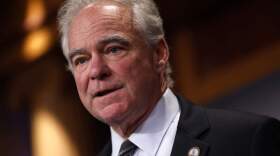ARI SHAPIRO, HOST:
The lights shining on the Super Bowl in Las Vegas this Sunday will be powered by solar energy generated on a nearby Indian reservation. People who live on that reservation cannot use the energy themselves. A senior Biden administration official recently visited the tribe, hoping to secure the support of Indigenous voters. Biden won Nevada last time by just under 3%, and organizers credit Native Americans with helping to secure that win. NPR's Ximena Bustillo reports.
XIMENA BUSTILLO, BYLINE: The Moapa River Indian Reservation is located just an hour north of Las Vegas, and they have the largest solar project in Indian country. Started in 2014 and still growing, the energy generated here doesn't stay at home. It powers other places, like the Allegiant Stadium, where the Super Bowl is happening, and also goes all the way to California.
JENNIFER GRANHOLM: This is kind of what I want to hear is, like, what are you guys planning? And with more or what - what needs to happen?
BUSTILLO: That success is why Energy Secretary Jennifer Granholm is visiting.
GRANHOLM: And so we see the tribes as total partners and friends, obviously, and we want to be able to make sure that we see them. And the only way you see people is if you come and visit their homes and visit their nations, their lands.
BUSTILLO: And that's why tribal members welcomed the visit, because even with big success in Vegas and beyond, the reservation is missing out on this energy and power, even with the big solar field on their land.
CALISTA CASUPANG: I really hope, you know, that we can move forward and get energy for our own community and start benefiting from the energy, clean energy, instead of just always giving it away and letting everybody else use it.
BUSTILLO: That's Moapa Band of Paiute Indians tribal council member Calista Casupang. The conversation was encouraging, but the stakes are high, and the tribe has been here before.
CASUPANG: I felt like we were being heard. I felt like it was very genuine and that we'll hear something back. I mean, we always - you know, you always have meetings, and you never get a follow-up.
BUSTILLO: So far, climate and infrastructure dollars have made their way to Nevada in the form of tax credits and road projects. But communicating some of these benefits to Nevadans on the ground has been a challenge for Democrats hoping to keep their votes this election. The more than 62,000 Indigenous people living in Nevada, which generally accounts for 3.5% of the state's population, have been credited with helping Democrats secure wins in recent elections. But the young tribal council members meeting with Granholm aren't ready to sign their ballot for Biden just yet. Here's council member Ivan Reel.
IVAN REEL: That's why I ended up voting for Biden in the last election, but I'm not currently up to date on if they are doing anything for us.
BUSTILLO: He said Biden shouldn't just bank on his vote. Reel and the rest of the tribe will be waiting to see whether the Biden administration's words are followed by action.
Ximena Bustillo, NPR News, Las Vegas. Transcript provided by NPR, Copyright NPR.
NPR transcripts are created on a rush deadline by an NPR contractor. This text may not be in its final form and may be updated or revised in the future. Accuracy and availability may vary. The authoritative record of NPR’s programming is the audio record.






